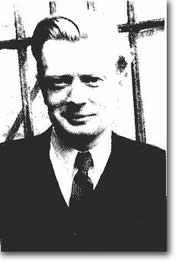Dr. Harald Poelchau grew up in a small town in Silesia, the son of a Protestant clergyman. He studied theology in Bethel, Marburg, Breslau and Tübingen and was assistant to Paul Tillich (in Frankfurt am Main) who became his mentor. After social studies with Carl Mennicke he applied for a job at the Tegel prison in Berlin. In April of 1933 he became the prison chaplain. In this position, he had access to many political prisoners who belonged to the resistance and he used his position to pass messages and provide them with assistance and support during their imprisonment and on the way to their execution.
Harald Poelchau belonged to the ”Kreisau Circle” where some of the leaders of the underground opposition were developing democratic concepts and plans for the structure of a new Germany for the time after Hitler’s regime.
Poelchau also supported a group called ”Uncle Emil” which worked to help hide and support Jews who were living underground. He helped the Jewish Latte family who had escaped deportation from Breslau. Together with Mrs. Schneider, a friend and the widow of a colleague, he found them jobs, kept them hidden and forged documents for the couple and their son Konrad. While his parents were caught by the Nazis and perished in Auschwitz, Konrad with the help of many friends managed to survive and became a famous conductor in Berlin after the war.
There were many other people persecuted by the Nazis who were helped by the Poelchaus. Between February and November of 1943 Harald Poelchau and his wife Dorothee hid Leontine Cohn and her daughter Rita in their apartment and other places with various friends in and around Berlin. Rita assumed the identity of Tina Weiss, the daughter of the Poelchaus’ friends. Poelchau also played an important part in the rescue of Charlotte Holzer, one of the people accused of belonging to the Herbert Baum Jewish communist underground group. Holzer had escaped from prison during a bombing raid in the summer of 1944.
In March of 1945 the Poelchaus hid Ralph and Rita Neumann, siblings who had escaped shortly before they were deported to a concentration camp. Together they survived the end of the war in Berlin.
In 1972 the Poelchaus were honored as ”Righteous Among the Nations”, and after his death his wife planted a tree in Yad Vashem.
This article was edited re-posted with the help of Dr. Harald Poelchau’s son and namesake, Mr. Harald Poelchau.
Bibliography
- ”Saving Konrad Latte” by Peter Schneider, New York Times Archives Article, 13.2.2000.
http://query.nytimes.com/gst/fullpage.html?res=9906E2DE173EF930A25751C0A9669C8B63&sec=&spon=&pagewanted=4 - Lexikon des deutschen Widerstandes, Hrsg.v. Wolfgang Benz und Walther H. Pehle, Frankfurt a.M. 1999, S.248, 383. ISBN-13: 978-3596150830
- Ruth Andreas-Friedrich, ”Der Schattenmann”, Frankfurt a.M., Suhrkamp 2000. ISBN-13: 978-3518396896
- Harald Poelchau, ”Die Ordnung der Bedrängten – Erinnerungen des Gefängnisseelsorgers und Sozialpfarrers (1903-1972)”. Teetz, Hentrich & Hentrich, 2004 ISBN 3-933471-50-8
- Klaus Harpprecht, ”Harald Poelchau. Ein Leben im Widerstand”, Rowohlt, Reinbek 2004, ISBN-13: 978-3498029692

